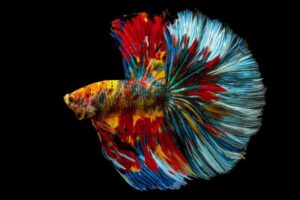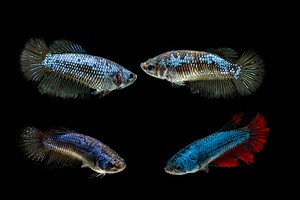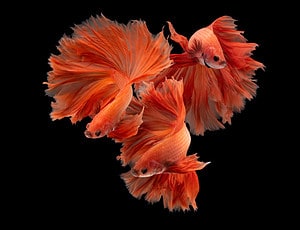When it comes to betta fish feeding, the water can be murky. Should you feed them once a day? Twice? More often? And exactly what should you be feeding them? Unfortunately, bettas are known for eating pretty much anything you put in their tank – even if they’re already full. As you can imagine, this frequently leads to health issues. Read on to find out how often you should feed your betta and much more!
Betta Fish Feeding
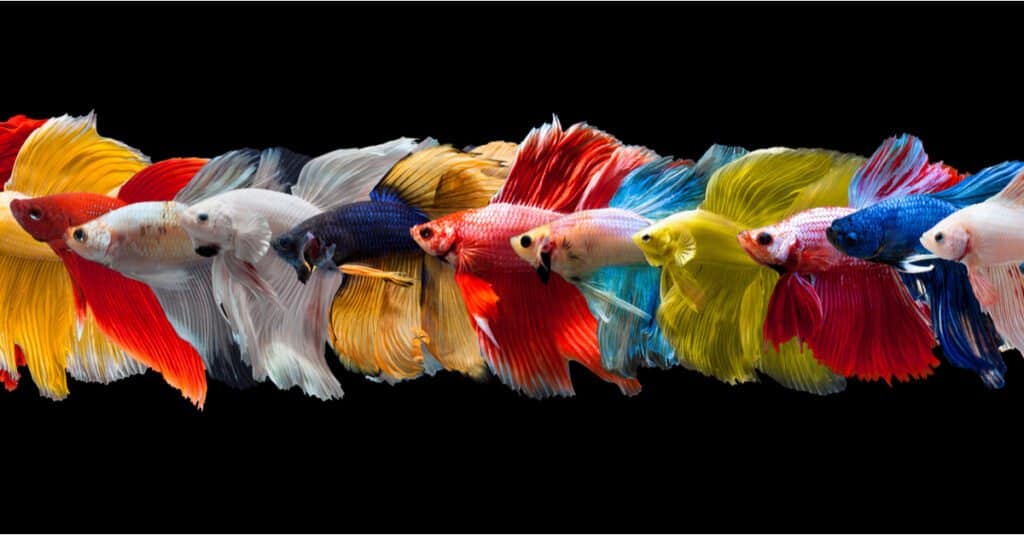
You should feed your betta fish once or twice a day.
©panpilai paipa/Shutterstock.com
One of the leading causes of illness and death in betta fish is an improper or excessive diet. The following guidelines will help you make good choices for your finned friend.
How Often Should You Feed Your Betta Fish?
You should feed your betta fish once or twice a day. How often you feed it depends on the portion size. A single daily feeding makes it less likely that you will overfeed your fish, but on the other hand, it may appreciate the second meal. If you decide to feed your betta twice daily, feed it in the morning and again in the evening. Remember not to accidentally double your betta’s daily portion.
Many sources recommend fasting your betta fish once a week. This is generally a good idea. Fasting gives your betta’s (sometimes tricky) digestive system a break and prevents bloating. If this seems cruel, keep in mind that most fish in the wild don’t eat every day. Chances are, it won’t even miss the food.
How Much Should You Feed Your Betta Fish?
If using pellets, you should feed your pet betta fish two to four pellets once or twice daily. This might not seem like much, but the pellets will expand once they hit the water, making them very filling. If using live, frozen, or freeze-dried food, feed your betta two to three pieces once or twice a day. As a general rule, a betta’s stomach is about the size of its eyeball, so don’t give it more than this in one sitting. Eyeball portions or weigh them to determine the right amount.
Some sources suggest feeding your betta fish what they can consume in three to five minutes. Unfortunately, this advice is likely to lead to overfeeding as bettas tend to overstuff themselves. Each fish is different, so you may have to operate on trial and error until you figure out how much your pet needs. If in doubt, consult with a veterinarian about the exact amount of food you should be giving your betta.
What Should You Feed Your Betta Fish?

Betta fish are carnivores, primarily insectivores, so they need lots of protein.
©panpilai paipa/Shutterstock.com
Betta fish are carnivores (primarily insectivores) with extremely short digestive tracts. As such, they need food tailored to their needs. Avoid purchasing fish food not made specifically for bettas; it usually won’t have enough protein. The foundation of your betta’s diet should be high-protein betta pellets. These contain the correct amount of nutrients to keep your fish healthy. For a treat, you can occasionally substitute live, frozen, or freeze-dried food – just make sure you give these in moderation.
The following foods are good for your betta in measured portions:
- Brine shrimp
- Mysis shrimp
- Bloodworms
- Daphnia
- Mosquito larvae
- Wingless fruit flies
Be sure to thaw out frozen food before throwing it in the tank. Also, you may want to consider occasionally feeding your betta fish living food as a treat. It helps satisfy their natural hunter instinct, which in turn prevents boredom and gives them a bit of exercise.
Can You Feed Your Betta Fish Human Food?
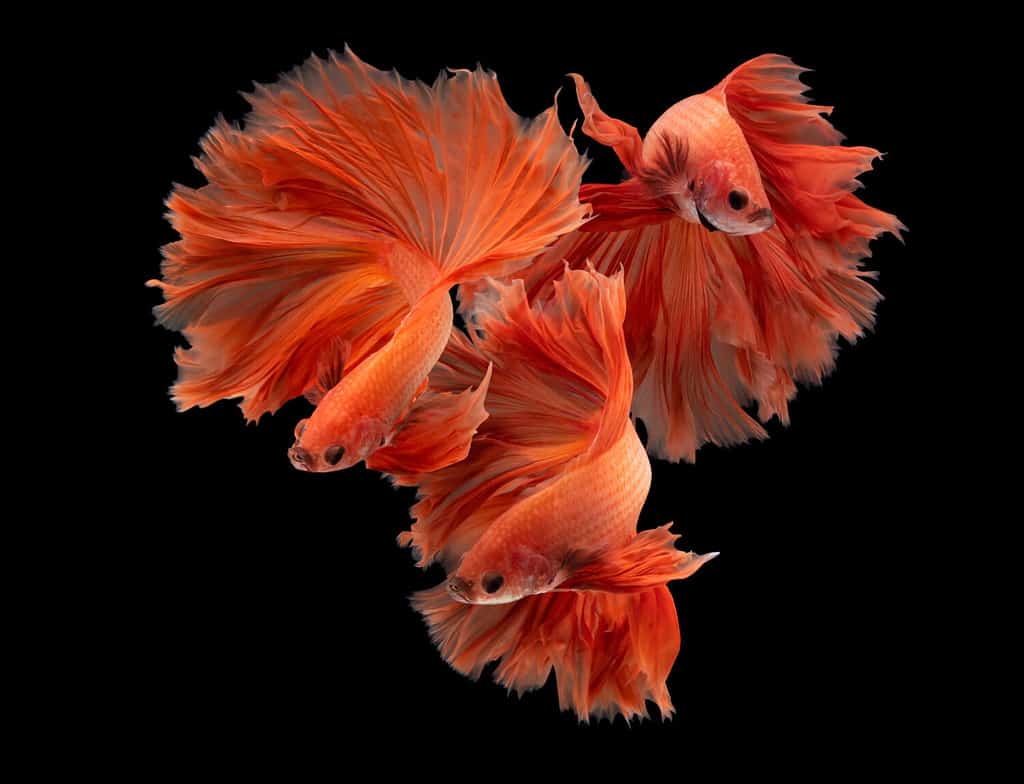
Avoid feeding your betta fish human food – it doesn’t have the right nutrients and can be harmful.
©panpilai paipa/Shutterstock.com
Some human foods are okay for betta fish while others are off-limits. The following human foods are okay in small amounts to counteract constipation (but not as a regular or main part of their diet):
- A piece of skinned and blanched pea
- Lettuce
- Cucumber
Do not feed your betta fish the following:
- Meat (including chicken). Betta fish don’t need this and it can mess with their digestive systems or cause obesity.
- Fish. Again, this is unnecessary and potentially harmful.
- Bread. Betta fish are carnivores and do not need bread products.
- Fruit (especially citrus fruits). Bettas don’t need fruit. Besides this, the acid in citrusy fruits can upset the pH balance in the tank.
- Vegetables. Other than needing relief from constipation, betta fish don’t need vegetables any more than they need fruit. Given how little food they need overall, it’s best to stick to foods that provide them with the proper nutrients.
- Most other human foods. There’s no reason to feed your betta fish most human foods and plenty of reasons not to. Also, avoid pet foods not intended for fish as they lack the nutrients they need and may contain harmful ingredients.
Avoid Overfeeding
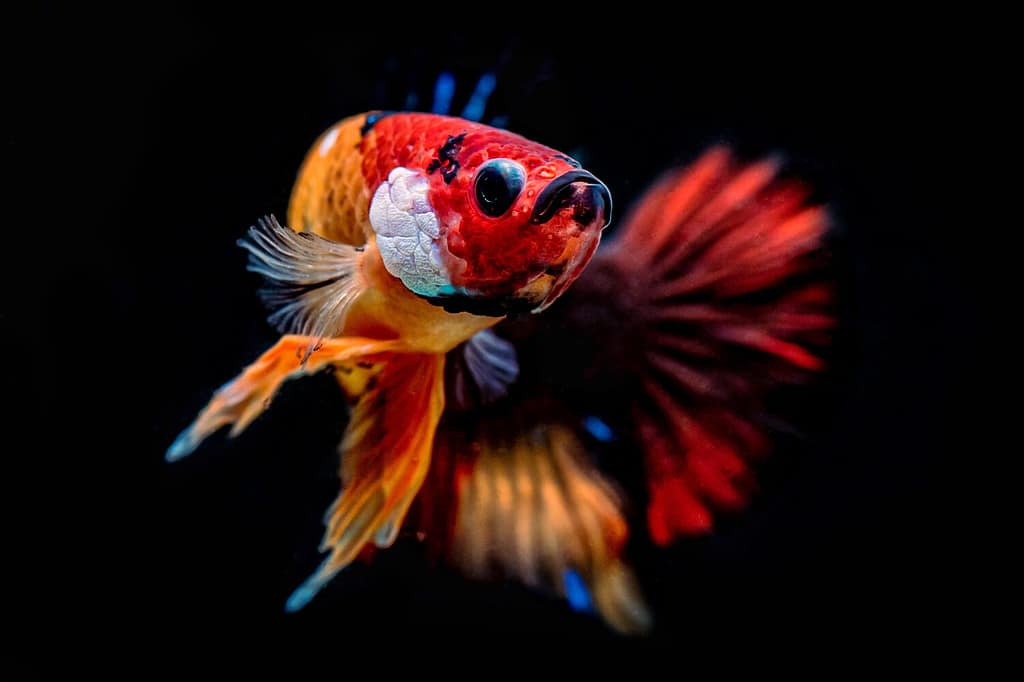
Betta fish tend to overeat, so be careful not to feed them too much.
©Matt Albanus/Shutterstock.com
Betta fish will overeat if you let them. This is because they retain their wild instincts, which tell them that they don’t know when they’ll get their next meal. And overfeeding them is easy to do since their stomachs are only about the size of one of their eyes. As the owner, it’s up to you to control their portion sizes to prevent obesity and illness.
The other problem with overfeeding your fish is that the excess food often goes uneaten and will eventually decay, fouling the water and dirtying the tank. This can make your betta fish very sick or even kill it. Remember that betta fish are surface feeders and typically won’t touch food once it sinks to the bottom.
Conclusion
When it comes to betta fish feeding, the key is to control their portion sizes so they don’t overeat. Also, invest in high-quality fish food that meets their nutritional needs. Avoid giving them human or pet foods other than food designed specifically for bettas.
The photo featured at the top of this post is © Digital Art StudioTH/Shutterstock.com
Thank you for reading! Have some feedback for us? Contact the AZ Animals editorial team.




